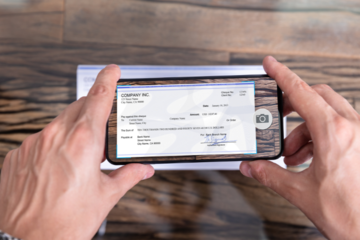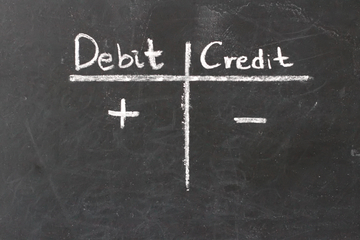If you're tight on cash, you have many options, including a cash advance. While this option may seem like the most convenient way to navigate out of a cash crunch, there is much more to a cash advance than what meets the eye. Because of this, it's important to understand all cash advance finance charges, implications, and possible alternatives. Let's take a closer look at the cash advance.
What is a Cash Advance?
A cash advance is a loan against the credit limit on your credit card. When you use the cash advance option, you'll receive cash from your credit card to meet short-term or emergency needs.
How Do Cash Advances Work?
While it may seem as harmless and easy as withdrawing cash with your debit card, credit card cash advances are very different. For starters, cash advances will have an entirely separate credit limit that represents a portion of your overall credit limit. Credit cards have specific limits on the highest cash advance amount you can advance. The cash advance limit for your credit card can be further tempered by individual factors, such as:
While your credit card may offer you one rate for normal purchases, cash advances will have a higher interest rate. At the same time, most credit card providers do not offer a grace period on cash advance amounts.
For normal credit card purchases, your grace period is the time between the end of your billing cycle and the payment due date. During this period, interest doesn't accrue on the balance. You may be able to avoid paying interest entirely for normal purchases as long as your balance is paid in full by the due date. However, the grace period typically doesn't apply to cash advances. Instead, interest will begin accruing as soon as you withdraw money from your credit card in the form of a cash advance.
How to Get a Cash Advance from My Credit Card
If you've decided a cash advance is the best short-term lending solution, there are multiple ways to access the funds:
- Go to an ATM. One of the easiest ways to take a cash advance from your credit card is through an ATM. You will need to have a PIN for the credit card. If you don't have a PIN, you must request one from your credit card provider. This may not be ideal if you are in dire financial straits and need cash immediately because it may take a few days to receive your PIN number. Another consideration for getting a cash advance from an ATM is there may be limits on how much cash you can withdraw in a day.
- Visit a bank or credit union. Another way to access your cash advance funds from your credit card is to visit your local bank or credit union. When you do, you will need to request a cash advance from the teller. The bank representative will process your card for the requested amount, and if it's approved, you will receive cash. Teller cash advances are one way to circumvent any ATM limits.
- Write a convenience check. If your credit card company issues convenience checks, you can use them in the same manner you would a personal check.
- Online transfer. The fourth and final way to take a credit card cash advance is to transfer money from your credit card to your spending account, such as a checking or money market. If allowed, you may be able to log into your credit card account to initiate the credit card cash advance online.
What Types of Fees Come with a Cash Advance
While a credit card cash advance may mean fast cash, you will pay a premium for it. For starters, most cash advances have a different and higher interest rate than balance transfers or purchases. For instance, some credit cards offer a 0% APR on purchases and balance transfers during an introductory period. After this period, the interest rate for the balance transfers and purchases may increase to a variable rate. However, the cash advance rate will usually be higher— no matter when you access the funds.
In addition to higher interest rates, credit card companies charge a cash advance fee. The cash advance fee tends to be around 5% of the total cash advance. For instance, if you take a $250 cash advance with a 5% fee, you can expect to pay an additional $12.50. You may also pay an ATM fee to the owner of the machine or a separate fee to the bank if the transaction is performed by a live teller.
Alternatives to Credit Card Cash Advances
While convenient, cash advances can have one of the highest costs of funds. As such, most financial experts suggest you avoid taking a cash advance from your credit card — unless no other option exists. Instead, you should exhaust all other options:
- Use a personal loan. A personal loan will usually have more attractive terms than cash advances. When you take out a personal loan, you will repay the loan based on a fixed interest rate. This rate will almost always be lower than the interest rate charged on cash advances.
- Borrow money from friends or family. While asking a friend or family member for money can be a humbling experience, it will almost always be a less expensive way to access the funds you need.
- Get a quick loan. A quick loan is an umbrella term that refers to multiple types of lending products. With a quick loan, you can receive the funds the same business day you're approved.
Frequently Asked Questions
Can I use my credit card to get a cash advance at any ATM?
Yes, you can use your credit card to get a cash advance at any ATM. However, you will need to have a PIN number issued by your credit card servicer. Another consideration is you may be required to pay an ATM fee to the owner of the machine. Make sure to understand all of the fees associated with a credit card cash advance before using this option.
Apply Through Integra Credit for Fast Emergency Loans
If you're considering a cash advance, you need money fast. Fortunately, Integra Credit may be able to help. Apply today or contact us with inquiries.
Sources
- What Is a Cash Advance Fee and How Does It Work? │Intuit Credit Karma
- What is a cash advance and how do they work?
- What Is a Cash Advance on a Credit Card │ Capital One
- 7 Alternatives to Credit Card Cash Advances - NerdWallet
- What Is a Cash Advance, and Should You Get One? │ Credit Cards │U.S. News
- What Is a Cash Advance? │Citizens
- Best Alternatives to Payday Loans in 2023 - NerdWallet
- How To Get Cash From A Credit Card At The ATM │Bankrate
- Alternatives To Cash Advances - Forbes Advisor
- Cash Advance: Definition, Types, and Impact on Credit Score
- What Is a Cash Advance and How Does It Work? - Experian



